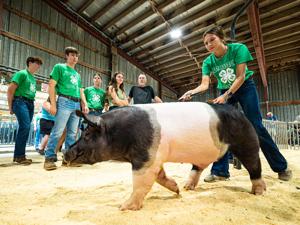At the recent Dubuque County Fair, a lively livestock auction showcased the hard work and dedication of young 4-H and FFA participants. The event not only stirred emotions but also offered significant financial rewards for the children who had spent months preparing their animals for sale.
As the auctioneer rapidly called out competing bids, excitement filled the barn where livestock of all kinds were displayed. Jillian Schmitt, 14, from Sherrill, Iowa, expressed her mixed feelings of nervousness and anticipation while bathing her hogs before the auction. “I feel nervous but excited,” she said. This sentiment resonated throughout the event, as hundreds of young participants presented a variety of animals, including hogs, goats, and cattle, in hopes of earning awards and recognition.
On the day of the auction, many young auctioneers received bids significantly exceeding market value. The atmosphere was palpable with emotion; some participants were visibly moved while others sported wide smiles. Lauren Jarding, 13, from Farley, Iowa, reflected on her experience, stating, “I feel pretty good about it. I’m sad that my animals are leaving, but I feel way better than I did on show day.” Lauren dedicated one hour each day to prepare her goats for the event, although some students committed up to four hours daily.
The financial aspect of the auction is crucial for many families. Jason Schmitt, Jillian’s father, emphasized the importance of the auction in making their efforts worthwhile. “If she was to raise these hogs by herself and sell them on the private market, there would be very minimal profit,” he explained. He noted that auction prices could reach upwards of $2 per pound, while market value often hovers below $1 per pound.
The structural changes in the hog industry further complicate the landscape for small producers. According to the 2024 Iowa Pork Industry Report, prepared by economic consultant Decision Innovation Solutions, large industrial farms are increasingly dominating Iowa’s hog market. The report indicates that 73% of Iowa’s hog farms now house more than 5,000 hogs, a significant rise from 69% in 2017 and 40% two decades prior.
For many participating in the auction, the proceeds serve a dual purpose. Angie Boyle, who has been involved in the fair for over ten years with her children, noted that many 4-H participants use their earnings to purchase animals for the following year. This process fosters ongoing engagement in 4-H and builds experience in agriculture.
The auction itself is a significant financial event, generating over $100,000 in sales, according to Kelsie Kinne, the Dubuque County Extension 4-H director. The beef show typically garners the highest revenue and attendance due to the number of animals involved. This year’s auction included 38 swine, 11 sheep, 39 goats, and approximately 75 beef showings.
Buyers at the auction often feel a personal connection to the young participants. Kinne remarked, “A lot of buyers are connected with the kids. They want to support the great program.” One such buyer, Richard Bradley, a long-time supporter of the fair and 4-H, expressed his desire to support his great-grandchildren who were auctioning goats. Now in his 80s, Bradley has contributed over 40 years to the Dubuque County Fair Association and served as a 4-H leader for 15 years.
Reflecting on his experience, Bradley said, “I love the fair. Years ago, my wife and kids would be here at 7 in the morning and leave at 11 at night.”
The day of the auction is a culmination of hard work for families involved in agriculture. Rachel Kieffer from Sherrill, Iowa, a mother to two 4-H participants, emphasized the fulfilling nature of the event. “Today is kind of full circle after all that work,” she remarked.
The Dubuque County Fair’s livestock auction not only offers financial benefits but also reinforces the values of hard work, community support, and a deep connection to agricultural traditions.
